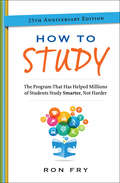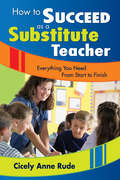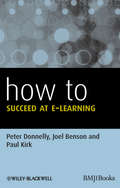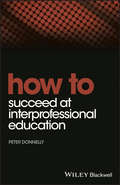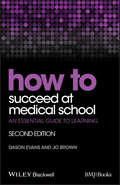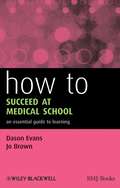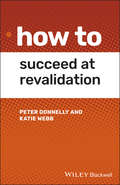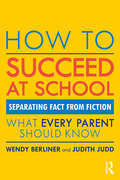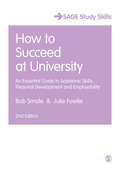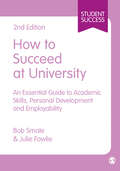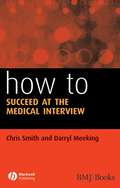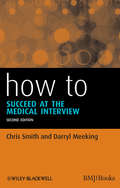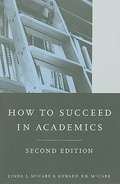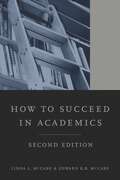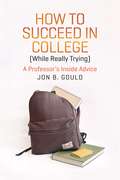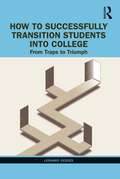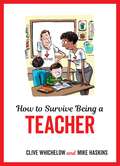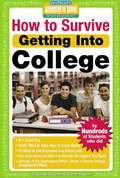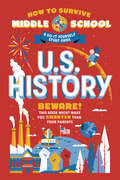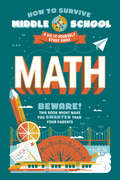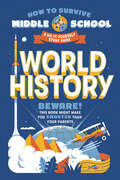- Table View
- List View
How to Study: The Program That Has Helped Millions of Students Study Smarter, Not Harder (Ron Fry's How to Study Program #3)
by Ron FryThe bestselling guide that has helped millions of students study smarter, not harder—updated for today&’s classroom.How to Study reveals the study skills all students need to know to be successful, whether the goal is landing a top scholarship, excelling in school, or preparing to return to school. This edition includes information on how to create an effective work environment, stand out in class, conduct research online, and much more. Fry also covers all the traditional elements of a winning study strategy, such as reading, writing, time management, memory, and test-taking skills. How to Study introduces a revolutionary study system along with examples that give students the edge in any learning environment. How to Study also: Prepares students of all ages to excel in their classes by developing effective study skillsShows students, in a quick, easy-to-read style, the essential skills that can be applied outside the classroom and later in lifeIncludes study tips for teaching and studying with young children; advice for fighting mid-study fatigue and boredom; tips for in-class learning; and more
How to Succeed as a Scientist
by Jane A. Langdale Barbara J. GabrysThis unique, practical guide for postdoctoral researchers and graduate students explains how to build and perfect the necessary research tools and working skills to build a career in academia and beyond. It is based on successful training workshops run by the authors: first, it describes the tools needed for independent research, from writing papers to applying for academic jobs; it then introduces skills to thrive in a new job, including managing and interacting with others, designing a taught course and giving a good lecture; and it concludes with a section on managing your career, from how to manage stress to understanding the higher education system. Packed with helpful features encouraging readers to apply the theory to their individual situation, the book is also illustrated throughout with real-world case studies to enable readers to learn from others' experience. It is a vital handbook for everyone seeking to make a successful scientific career.
How to Succeed as a Substitute Teacher: Everything You Need From Start to Finish
by Cicely A. RudeThis handbook provides tools to help substitute teachers walk into a new classroom, create a positive environment, and deliver instruction that meets curriculum standards.
How to Succeed at E-learning
by Paul Kirk Peter Donnelly Joel BensonA basic guide to getting the best from e-learning for medical students, teachers and all healthcare professionalsHow to Succeed at e-Learning answers the needs of all healthcare professionals either starting or continuing their studies but not knowing where to begin with e-learning. It is a valuable guide for learners in undergraduate and postgraduate medicine as well as related health professionals and essential for teachers of medicine who are beginning to transfer from print to electronic teaching and need to understand effective methods of presentation.
How to Succeed at Interprofessional Education (How To)
by Peter DonnellyHealthcare professionals work not only within multidisciplinary teams but also with allied health and non-healthcare professionals. How to Succeed at Interprofessional Education is a practical introduction to the concepts of interprofessional education (IPE) within medicine. It provides the rationale and framework for the effective delivery of IPE in a range of health care contexts. The contents include definitions, the evidence that IPE is effective, and the principles to ensure successful delivery. A series of examples of IPE in different clinical settings is described that lead to improved decision making and improved clinical care for patients.
How to Succeed at Medical School
by Dason Evans Jo BrownCan you adapt to the wide variety of learning environments in medicine? Can you show your best abilities in the exams at the same time as learning to be a doctor? Can you balance your studies with an enjoyable social life? Can you develop your professionalism and manage your 'digital footprint'? How to Succeed at Medical School will help you learn these vital skills, and much more. Written by experienced medical school teachers and packed full of case studies, illustrations, quotes from other students, tip boxes, exercises, portfolios and learning techniques to help you communicate, study and revise - it's an essential resource to help you thrive at medical school. This thoroughly updated second edition includes new chapters on Professionalism and Teaching, and provides invaluable insight into what to expect from the start of medical school right through to the start of your medical career.
How to Succeed at Medical School: An Essential Guide to Learning (How To #25)
by Dason Evans Jo BrownCan you adapt to the wide variety of learning environments in medicine? Can you learn for exams at the same time as training to be a doctor? Can you stay focused on the future while getting today’s job done? Can you achieve a life-work balance? How to Succeed at Medical School will help you learn these vital skills, and much more. This excellent guide to the study skills essential for surviving and thriving at medical school gives you insight into what to expect, covering the early days right through to clinical attachments. With case studies, illustrations, quotes from other students, tip boxes, exercises, portfolios, and learning techniques to help you communicate and to study and revise — it’s jam-packed to help you succeed! Written by experienced medical school teachers, this is your guide from the start of medical school to the start of your medical career. Pre-publication reviews: "… I learned a lot, found the enthusiasm of the text motivating and inspiring and really enjoyed reading it." –Second year medical student, Royal Free and UCL "I just wish this book had been available when I started my clinical placements." –Second year medical student, University of Liverpool "It helps aid students to learn effectively and efficiently and even tells you how you will know when you know enough!" –Professor Parveen Kumar
How to Succeed at Revalidation (How To)
by Peter Donnelly Katie WebbDoctors in the UK are required to provide evidence of their fitness to practice—all doctors registered with the General Medical Council (GMC) need to revalidate to maintain their registration. How to Succeed at Revalidation contains up-to-date information on the current regulatory framework and step-by-step guidance to the entire revalidation process. Offering expert advice on how to undertake the process from the perspective of the appraisee, the appraiser, and the employer, this practical, quick-reference guide covers each of the Good Medical Practice (GMP) domains: Knowledge, Skills and Performance; Safety and Quality; Communication, Partnership and Team Work; and Maintaining Trust. Throughout the text, numerous examples describe different models of appraisal and reflection, identify activities that map to each domain, and demonstrate how revalidation requirements can be achieved in the course of daily practice. This much-needed guide: Covers regulatory processes in medicine and healthcare from both UK and international perspectives Reviews the background that led to the implementation of revalidation Discusses the new GMP requirements for all doctors in the UK Explores the possible future of revalidation How to Succeed at Revalidation is essential reading for all qualified and trainee doctors, undergraduate and postgraduate learners, tutors and trainers seeking to navigate the revalidation process in the UK.
How to Succeed at School: Separating Fact from Fiction
by Wendy Berliner Judith JuddThis book shines a light on the best research into learning and the brain development that makes it all possible. Written by two distinguished education journalists, it provides an invaluable guide to the latest information for parents seeking to help their children to make the best use of their potential and steer a true course through an often confused, noisy and crowded learning landscape where ideas compete and nothing can seem clear. Summarising the most up to date and significant research in a jargon-free and understandable way, this book provides readers with simple and clear access to knowledge and information about what really helps children learn and flourish. Drawing on expert analysis, interviews and example studies, the chapters tackle common misconceptions and myths, and explore crucial topics including: The use of neuroscience in education; The role of parents and how all parents can help their children learn; What works in the classroom and the best ways of teaching a child. The first of its kind, this seminal text is a unique resource for parents, carers, primary and secondary teachers, student teachers, policymakers and anyone interested in the development of children and how they learn.
How to Succeed at University
by Ms Julie Fowlie Mr Bob SmaleHow to Succeed at University is a uniquely comprehensive study skills and personal development guide, incorporating coverage of personal skills, academic skills and job search skills within the framework of personal development planning. All the key skills are covered, with a strong focus on the importance of the continuing personal development process and the ultimate goal of employability. In terms of personal skills, the book offers advice on handling stress, time management and developing interpersonal skills. The academic skills section concentrates on the skills crucial for learning effectively, carrying out research, writing up your work and tackling exams. The job search skills covered include discussion of how to identify the best job according to skill set and how to stand out in the applications and selection process. This book will be an essential companion for all undergraduate students, whatever their subject of study, and for those preparing for study at University. SAGE Study Skills are essential study guides for students of all levels. From how to write great essays and succeeding at university, to writing your undergraduate dissertation and doing postgraduate research, SAGE Study Skills help you get the best from your time at university.
How to Succeed at University: An Essential Guide to Academic Skills, Personal Development & Employability (SAGE Study Skills Series)
by Julie Fowlie Bob SmaleLecturers, request your electronic inspection copy here Achieve all your goals for university – whatever they are! How to Succeed at University provides straightforward, practical advice for anyone experiencing university life. Introducing the personal, academic and life skills you need to succeed - both at university and in today’s competitive job market – you’ll find help with managing your time and budget, and guidance on a range of study skills including skills for research and examination success. You’ll also learn how to identify and develop key transferable skills that will stay with you throughout your professional life. Discover how to: Improve your employability prospects and give yourself the advantage in the job market Benefit from other students' experience, with top tips and insider advice on succeeding in your studies Explore the uses of digital technologies in learning and assessment Use what you learn right away, with handy downloadable checklists and worksheets. Pragmatic, up-front and sympathetic, this is an essential companion for all undergraduate students, as well as anyone preparing for study at university. SAGE Study Skills are essential study guides for students of all levels. From how to write great essays and succeeding at university, to writing your undergraduate dissertation and doing postgraduate research, SAGE Study Skills help you get the best from your time at university. Visit the SAGE Study Skills hub for tips, resources and videos on study success!
How to Succeed at University: An Essential Guide to Academic Skills, Personal Development & Employability (SAGE Study Skills Series)
by Julie Fowlie Bob SmaleLecturers, request your electronic inspection copy here Achieve all your goals for university - whatever they are! How to Succeed at University provides straightforward, practical advice for anyone experiencing university life. Introducing the personal, academic and life skills you need to succeed - both at university and in today's competitive job market - you'll find help with managing your time and budget, and guidance on a range of study skills including skills for research and examination success. You'll also learn how to identify and develop key transferable skills that will stay with you throughout your professional life. Discover how to: Improve your employability prospects and give yourself the advantage in the job market Benefit from other students' experience, with top tips and insider advice on succeeding in your studies Explore the uses of digital technologies in learning and assessment Use what you learn right away, with handy downloadable checklists and worksheets. Pragmatic, up-front and sympathetic, this is an essential companion for all undergraduate students, as well as anyone preparing for study at university. SAGE Study Skills are essential study guides for students of all levels. From how to write great essays and succeeding at university, to writing your undergraduate dissertation and doing postgraduate research, SAGE Study Skills help you get the best from your time at university. Visit the SAGE Study Skills website for tips, quizzes and videos on study success!
How to Succeed at the Medical Interview (How To #27)
by Chris Smith Darryl MeekingDoctors are likely to undergo several interviews of different types during their career, and this new title in the popular 'How to' series aims to guide the medical professional through the steps necessary to thoroughly prepare for this competitive process. Contents include: Discussion of the different types of medical interview How to prepare for interview How to optimise your performance Information about common questions and how best to answer them Information about knowledge-based questions currently asked Coverage of questions that test generic skills and how to answer them How to prepare for competency-based assessments and tasks. An ideal companion for all health professionals faced with an interview, How to Succeed at the Medical Interview will assist in building confidence and ensuring that candidates are as thoroughly prepared as possible.
How to Succeed at the Medical Interview (How To #42)
by Chris Smith Darryl MeekingHow to Succeed at the Medical Interview provides candidates with a competitive edge. It reduces the likelihood of unexpected questions or situations and helps improve confidence before and during the medical interview. This new second edition includes updated content on changes to the structure of healthcare and how this affects both the application and interview process. It details the types of questions that will be asked at medical interviews and also provides improved guidance for overseas doctors and healthcare professionals and for those seeking to practice abroad. How to Succeed at the Medical Interview is the ideal guide for Foundation Programme trainees, Specialist Registrars and General Practitioner trainees. It is also valuable for healthcare professionals facing competitive medical interviews at any stage of their career.
How to Succeed in Academics
by Linda L. Mccabe Edward R. B. MccabeLinda L. McCabe and Edward R. B. McCabe, both professors at the University of California, Los Angeles, write clearly and accessibly, illustrating their main points with sample case scenarios.
How to Succeed in Academics, 2nd edition
by Linda L. McCabe Edward R.B. McCabeThis new edition of How to Succeed in Academics provides up-to-date mentoring on all aspects of a successful academic career, particularly a career in the sciences. Linda L. McCabe and Edward R. B. McCabe bring decades of expertise and experience to such topics as marketing your ideas through posters, talks, manuscripts, and grant proposals; developing strategies for applying, interviewing, and negotiating for training programs and jobs; establishing professional networks and seeking leadership opportunities; improving your teaching, speaking, and writing skills; and setting goals and creating schedules to achieve them.
How to Succeed in College (While Really Trying): A Professor's Inside Advice
by Jon B. GouldAfter years of preparation and anticipation, many students arrive at college without any real knowledge of the ins and outs of college life. They’ve been focused on finding the right school and have been carefully guided through the nuances of the admissions process, but too often they have little knowledge about how college will be different from high school or what will be expected of them during that crucial first year and beyond. Written by an award-winning teacher, How to Succeed in College (While Really Trying) provides much-needed help to students, offering practical tips and specific study strategies that will equip them to excel in their new environment. Drawing on years of experience teaching at a variety of campuses, from large research universities to small liberal arts colleges, Jon B. Gould gives readers the lay of the land and demystifies the college experience. In the course of the book, students will learn how to identify the best instructors, how to choose classes and settle on a major, how to develop effective strategies for reading and note taking, and how to write good papers and successfully complete exams. Because much of the college experience takes place outside of the classroom, Gould also advises students on how to effectively manage their cocurricular activities, work obligations, and free time, as well as how to take advantage of the typically untapped resources on every campus. With candid advice and insights from a seasoned insider, this guide will leave students better prepared not only to succeed in college but to enjoy it as well.
How to Succeed in College: A Professor's Inside Advice (Chicago Guides To Academic Life Ser.)
by Jon B. GouldAfter years of preparation and anticipation, many students arrive at college without any real knowledge of the ins and outs of college life. They’ve been focused on finding the right school and have been carefully guided through the nuances of the admissions process, but too often they have little knowledge about how college will be different from high school or what will be expected of them during that crucial first year and beyond. Written by an award-winning teacher, How to Succeed in College (While Really Trying) provides much-needed help to students, offering practical tips and specific study strategies that will equip them to excel in their new environment. Drawing on years of experience teaching at a variety of campuses, from large research universities to small liberal arts colleges, Jon B. Gould gives readers the lay of the land and demystifies the college experience. In the course of the book, students will learn how to identify the best instructors, how to choose classes and settle on a major, how to develop effective strategies for reading and note taking, and how to write good papers and successfully complete exams. Because much of the college experience takes place outside of the classroom, Gould also advises students on how to effectively manage their cocurricular activities, work obligations, and free time, as well as how to take advantage of the typically untapped resources on every campus. With candid advice and insights from a seasoned insider, this guide will leave students better prepared not only to succeed in college but to enjoy it as well.
How to Successfully Transition Students into College: From Traps to Triumph
by Leonard GeddesChallenging traditional notions about why successful high school graduates struggle in college, this book sheds light on the obstacles that hinder a seamless transition and provides clear guidance on how to overcome them. Drawing from research and real-life stories of educators and students across a variety of institutions, Geddes illuminates a critical truth: it’s the successes students had in high school that work against them in college, not their failures. This book explores the hidden structural, functional, and cognitive traps that undermine students’ academic work, strain teacher-student relationships, and impose artificial limits on their potential. Armed with formulas for academic success, it provides tools for guiding students towards levels of high performance and supplies teaching methods for how to create an educational environment conducive to success. Packed with practical advice, actionable steps, and inspiring success stories, this landmark book serves as an invaluable roadmap for college educators seeking to empower their students and revolutionize their institutions.
How to Survive Being a Teacher: Tongue-In-Cheek Advice and Cheeky Illustrations about Being a Teacher
by Clive Whichelow Mike HaskinsA new term begins and you can’t wait for it to end. If only the holidays were longer… or school didn’t exist. To get through it, you’re going to need survival skills. This mischievous little book will help see you through your years as a teacher with tongue-in-cheek advice and cheeky illustrations.
How to Survive Being a Teacher: Tongue-In-Cheek Advice and Cheeky Illustrations about Being a Teacher
by Clive Whichelow Mike HaskinsA new term begins and you can’t wait for it to end. If only the holidays were longer… or school didn’t exist. To get through it, you’re going to need survival skills. This mischievous little book will help see you through your years as a teacher with tongue-in-cheek advice and cheeky illustrations.
How to Survive Getting into College
by Rachel KornHundreds of students share their hard-won wisdom, thoughts, strategies, struggles, and even failures. Filled with tips, tricks, humor, and horror stories, as well as practical advice on applications, interviews, and financial aid, the book is a lifeline for high school juniors and seniors.
How to Survive Middle School: A Do-It-Yourself Study Guide (HOW TO SURVIVE MIDDLE SCHOOL books)
by Rebecca Ascher-Walsh Annie ScavelliBEWARE—THIS BOOK MIGHT MAKE YOU SMARTER THAN YOUR PARENTS! Navigate the wilderness of middle school U.S. History with this hands-on, comprehensive study guide for 6th-8th graders!This highly illustrated, handy field guide makes learning an adventure inside and outside of the classroom. Study with helpful illustrations, detailed tables, diagrams, and maps, essential vocabulary lists, and expert knowledge presented in a fun, bold, and easy-to-understand format. Explore and master topics like: • Native American Peoples • European Colonies • Declaration of Independence • Civil War • Industrial Revolution • World Wars I & II • The Great Depression • The Cold War • Civil Rights • The Vietnam War • The War on Terror • and more! The How to Survive Middle School study guides cover essential middle school subjects with interactive texts, useful study techniques, and engaging illustrations that make information stick! The included reflective questions and write-in sections foster critical thinking and problem-solving skills, helping readers become independent learners. Each book is vetted by curriculum experts to perfectly complement middle school lesson plans. Other available subjects: World History, English, Math, and Science.
How to Survive Middle School: A Do-It-Yourself Study Guide (HOW TO SURVIVE MIDDLE SCHOOL books)
by Matt Fazio Concetta OrtizBEWARE—THIS BOOK MIGHT MAKE YOU SMARTER THAN YOUR PARENTS! Navigate the wilderness of middle school Math with this hands-on, comprehensive study guide for 6th-8th graders!This highly illustrated, handy field guide makes learning an adventure inside and outside of the classroom. Study with helpful illustrations, detailed tables, diagrams, and graphs, essential vocabulary lists, and expert knowledge presented in a fun, bold, and easy-to-understand format. Explore and master topics like: • Fractions and Decimals • Ratio and Proportions • Positive and Negative Integers • The Pythagorean Theorem • Solving Equations and Inequalities • Linear Relationships • Graphing Systems • Functions • Statistics and Probability • Area and Volume • and more! The How to Survive Middle School study guides cover essential middle school subjects with interactive texts, useful study techniques, and engaging illustrations that make information stick! The included reflective questions and write-in sections foster critical thinking and problem-solving skills, helping readers become independent learners. Each book is vetted by curriculum experts to perfectly complement middle school lesson plans. Other available subjects: World History, English, Science, and U.S. History.
How to Survive Middle School: A Do-It-Yourself Study Guide (HOW TO SURVIVE MIDDLE SCHOOL books)
by Elizabeth M. FeeBEWARE—THIS BOOK MIGHT MAKE YOU SMARTER THAN YOUR PARENTS! Navigate the wilderness of middle school World History with this hands-on, comprehensive study guide for 6th-8th graders!This highly illustrated, handy field guide makes learning an adventure inside and outside of the classroom. Study with helpful illustrations, detailed tables, diagrams, and maps, essential vocabulary lists, and expert knowledge presented in a fun, bold, and easy-to-understand format. Explore and master topics like: • Ancient Civilizations • The Middle Ages and the Renaissance • The Industrial Revolution and the Age of Enlightenment • Imperialism and Colonization • World Wars I & II • The Postwar World and the Digital Age • Climate Change • and more! The How to Survive Middle School study guides cover essential middle school subjects with interactive texts, useful study techniques, and engaging illustrations that make information stick! The included reflective questions and write-in sections foster critical thinking and problem-solving skills, helping readers become independent learners. Each book is vetted by curriculum experts to perfectly complement middle school lesson plans. Other available subjects: English, Math, Science, and U.S. History.
